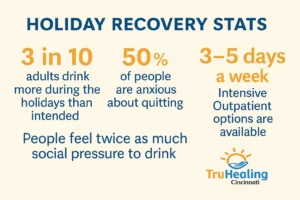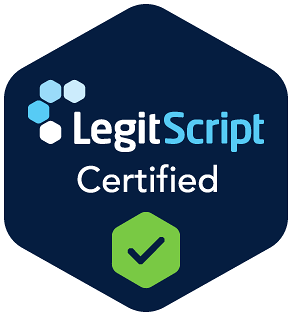It might’ve happened at a doctor’s office.
Or during a moment you weren’t expecting—one too many nights of “just a couple drinks” turning into something blurrier.
Or maybe it came quietly, like a sentence you already knew but didn’t want to say out loud.
Alcohol Use Disorder.
Whether you heard it from a clinician or whispered it to yourself, that moment can feel crushing.
Not because it changes everything. But because it confirms what a part of you already suspected:
Something has to change.
If you’re newly diagnosed and afraid to take the next step, especially this time of year—when the world is glittering with holiday pressure and New Year promises—know this:
You’re not broken. You’re not behind. You’re not alone.
You’re standing at the edge of something important. And you don’t have to cross it all at once.
A Diagnosis Is Not a Sentence—It’s a Starting Point
Hearing the words “alcohol addiction” might feel like a full stop.
But often, it’s the first time the story actually gets honest.
You’re not crazy.
You’re not dramatic.
You’ve been coping—with the best tools you had.
That “functioning” version of you—the one who shows up to work, manages a household, masks well, even jokes about drinking a little too much—is real.
So is the quiet panic underneath.
What a diagnosis gives you is language, structure, and options.
It doesn’t define you. It frees you to explore help that works.
It’s Okay If You’re Scared to Stop
People rarely talk about this part.
They go from “I knew I had a problem” to “treatment saved my life,” skipping over the scary, awkward, confusing middle.
That middle is what you’re in.
And it often sounds like:
- “But I’ve tried to quit before, and it didn’t stick.”
- “How will I handle anxiety without it?”
- “What will people think if I stop drinking completely?”
- “Am I really that bad?”
The fear isn’t irrational. It’s your brain—wired by habit and survival—facing uncertainty.
But here’s the reframe:
Starting alcohol addiction treatment isn’t about cutting something out of your life.
It’s about letting something better in.

What Alcohol Addiction Treatment Actually Involves
There’s a myth that treatment has to be dramatic, residential, or require dropping out of your life.
But for most people—especially high-functioning adults managing new diagnoses—it looks like this:
1. Medical Support
If you’re physically dependent, your treatment may begin with medically supervised detox, so your body can safely adjust.
2. Outpatient Care (Like IOP)
At TruHealing Cincinnati, our Intensive Outpatient Program (IOP) lets you keep living your life—while getting 3–5 days a week of therapy and support.
3. Trauma-Informed Therapy
Many people drink to manage underlying trauma, anxiety, or grief. We help address what’s underneath—not just the substance.
4. Medication Options (If You Choose)
Some people benefit from medications like naltrexone or acamprosate to reduce cravings. Others focus on therapy alone.
It’s your call.
5. Community Without Shame
Group therapy in IOP is built for people who feel nervous, unsure, or new to this. Everyone had a first session. You won’t be the only one starting over.
Why Starting Before the New Year Actually Helps
You may be tempted to wait—until January, until after one last holiday, until you feel “more ready.”
But the truth is, healing never shows up on a clean schedule.
And starting treatment in December means:
- You enter the New Year with momentum
- You don’t have to white-knuckle your way through holiday triggers
- You’re not alone during a season that quietly wrecks a lot of people emotionally
It’s not about pressure. It’s about relief.
And giving yourself something better than a resolution—a real reset.
You’re Still You. This Just Helps You Come Back to Yourself
One of the biggest fears we hear is:
“Will treatment change who I am?”
Short answer: no.
Long answer: it will probably help you become more of who you’ve always been—without the filter of alcohol.
In alcohol addiction treatment, you’ll explore:
- Who you are without a buzz
- What stress really feels like—and how to manage it
- What joy actually feels like when it’s not numbed
- What you want to rebuild and what you’re ready to let go
Medication Doesn’t Have to Mean Losing Control
If you’re scared to take medication, you’re not alone.
Many newly diagnosed clients worry about:
- Side effects
- Feeling “blunted” or “zombied”
- Replacing one substance with another
- Losing their autonomy
At TruHealing Cincinnati, medication is never forced.
We’ll walk through options based on your needs, not a standard formula.
Some people take meds short-term to stabilize. Others don’t take them at all. The point is:
You’re in charge of your care. We’re here to guide—not override—your choices.
You Deserve Care, Even If You’re “Still Doing Okay”
Many people who seek help in December aren’t at rock bottom. They’re:
- Still working
- Still showing up for family
- Still getting things “done”
But they’re also:
- Exhausted by the act
- Worried about how much they’re drinking
- Tired of hearing their own promises to cut back
You don’t have to collapse to be worthy of care.
If you’re using alcohol to survive—emotionally, mentally, or physically—that’s enough reason to explore support.
And If You’re Reading This From Kentucky, Help Is Close
If you’re near Lawrenceburg, Lexington, or Louisville, Kentucky, our alcohol addiction treatment programs in Cincinnati are accessible—and open to you.
Some clients travel in for sessions. Others attend virtually (if eligible). Either way, we can help.
FAQs: Starting Alcohol Addiction Treatment at TruHealing Cincinnati
Do I have to stop drinking before I begin treatment?
No. If you’re still drinking, that’s okay. We’ll meet you where you are and help you build a plan that keeps you safe and supported.
What if I don’t want medication?
Then we don’t use it. We offer options, not mandates. You’ll always have the final say in your care.
How long is outpatient treatment?
Intensive Outpatient Treatment (IOP) typically lasts 8–12 weeks, with 3–5 sessions per week. We tailor the program to your life and recovery pace.
Is everything confidential?
Yes. Your diagnosis, participation, and treatment details are private and protected by law.
Will I have to tell work or family?
Only if you choose to. We can help you navigate those conversations—but they’re always your choice.
Take the First Step—Even If It’s a Small One
You don’t need a perfect plan.
You don’t need to be “ready” in the way movies portray.
You just need to be willing to ask for a little help.
Call (888) 643-9118 or visit our Alcohol Addiction Treatment page to talk with someone who gets it.
This December, don’t wait to crash to start healing.
Choose clarity now—and step into the New Year with something stronger than a resolution.


